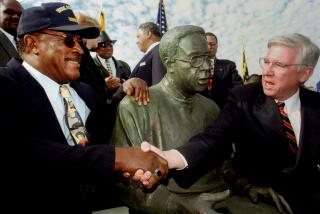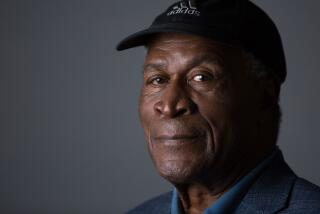Kingsley Amis; British Novelist and Poet
- Share via
LONDON — British writer Kingsley Amis, satirist, curmudgeon, poet and the original “angry young man,” died in a hospital here Sunday, a month after crushing his back in a fall. He was 73.
A literary lion in Britain for four decades, Amis was best known for what he called his “serio-comedies,” novels of slashing wit and barbed insight into the stratified world of British society. His son Martin Amis is also one of Britain’s leading novelists.
Knighted by Queen Elizabeth II, Sir Kingsley Amis published his 21st novel, a comedy of manners called “The Russian Girl,” last year.
But it was his first novel, “Lucky Jim,” a spoof on academic life published in 1953, that earned him popular success and enduring fame.
The novel’s protagonist, an unheroic college lecturer with radical ideas, strongly influenced a group of British novelists and playwrights who became known as the “Angry Young Men” for their scorn of British society after World War II. Amis rejected the label as “a very boring journalistic phrase.”
A spokeswoman for St. Pancras Hospital, where Amis was being treated for a crushed vertebrae, said he died peacefully Sunday morning. No cause of death was announced.
In addition to his novels, the prolific Amis, who became increasingly conservative and unabashedly politically incorrect with age, wrote half a dozen volumes of verse and once called poetry “a higher art.”
“I would have been a poet entirely if I had my way,” he said.
He was a fabled raconteur and a sought-after literary critic. Amis hated airplanes and London’s subway system, was afraid of the dark and did not like to be alone, he noted in his 1991 memoirs.
A clerk’s son born in London and proud of his working-class origins, Amis entered Oxford University in 1941 and served three years in the British army during World War II.
Needing a job that would give him time to write and also support his new wife, Hilary Bardwell, and their son Martin, the would-be novelist became a lecturer in English at Swansea University in 1949. Later, richer and more famous, Amis would teach in the United States as a visiting fellow at Princeton University.
Amis moved home to London in 1963 and wrote in a steady stream: novels, poetry, songs, a book on drinking, one on Rudyard Kipling and, under the pseudonym Robert Markham, a spy thriller about James Bond.
“He will be much missed and he will be remembered as a curmudgeonly figure. There is nobody like him left from that generation,” said fellow writer Auberon Waugh. “He did not give a damn what other people thought about him, and he said what he thought.”
Indeed, Amis’ unlikable female characters drew feminist fire, but he dismissed it.
“The trouble is that people treat novels as general statements. If a novel contains an unpleasant woman--or two unpleasant women--it’s called an attack on women,” he once told Reuters.
Critics who claimed his novels attacked particular sectors of society were missing the point of fiction, he said, noting: “Novels aren’t supposed to be fair.”
“What I really wanted to do was write about human relations in society, but in a reasonably straightforward style,” he said. “I think it’s a great sin if the novelist doesn’t keep you absolutely informed of what’s happening--I can’t bear wondering if a character is dead or not, or dreaming or not.”
In 1986, Amis won Britain’s top award for literature, the Booker Prize, for his 17th novel, “The Old Devils.” It was a dark work, but not autobiographical, Amis insisted.
Amis’ first marriage ended in 1963. Two years later, he married novelist Elizabeth Howard; they divorced in 1983. In recent years, Amis shared a house in North London with his first wife and her third husband.
He had had a good run, Amis once reflected.
“I’m not exactly an entertainer pure and simple, not exactly an artist pure and simple, certainly not an incisive critic of society, and certainly not a political figure though I’m interested in politics,” he said. “I think I’m just a combination of some of those things.”
“I’ve only occasionally had to write for money and it was an awful, awful experience,” he noted on another occasion. “I’ve been enormously lucky.”
Besides son Martin, Amis also leaves another son and a daughter.
Times staff writer Eric Lichtblau contributed to this story.
More to Read
Sign up for our Book Club newsletter
Get the latest news, events and more from the Los Angeles Times Book Club, and help us get L.A. reading and talking.
You may occasionally receive promotional content from the Los Angeles Times.









